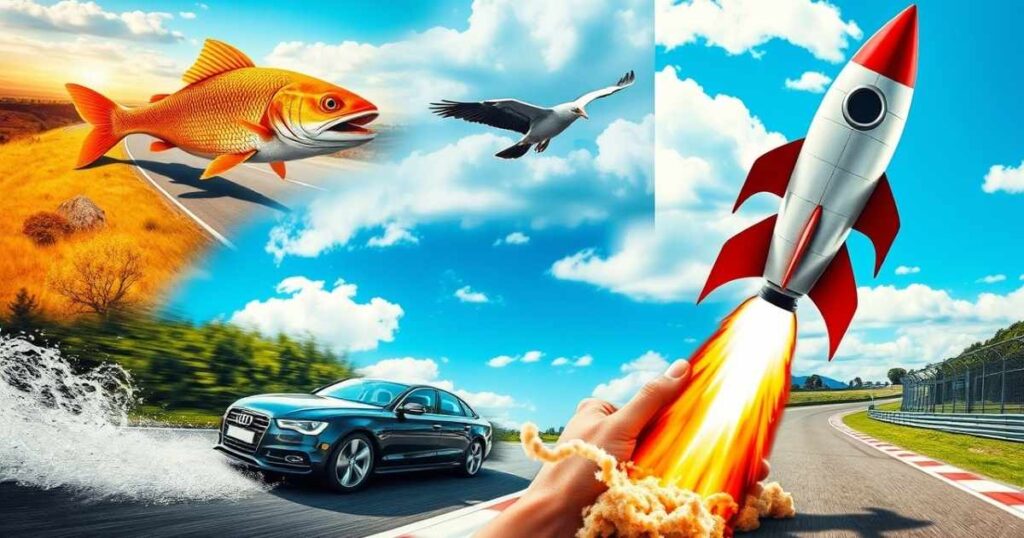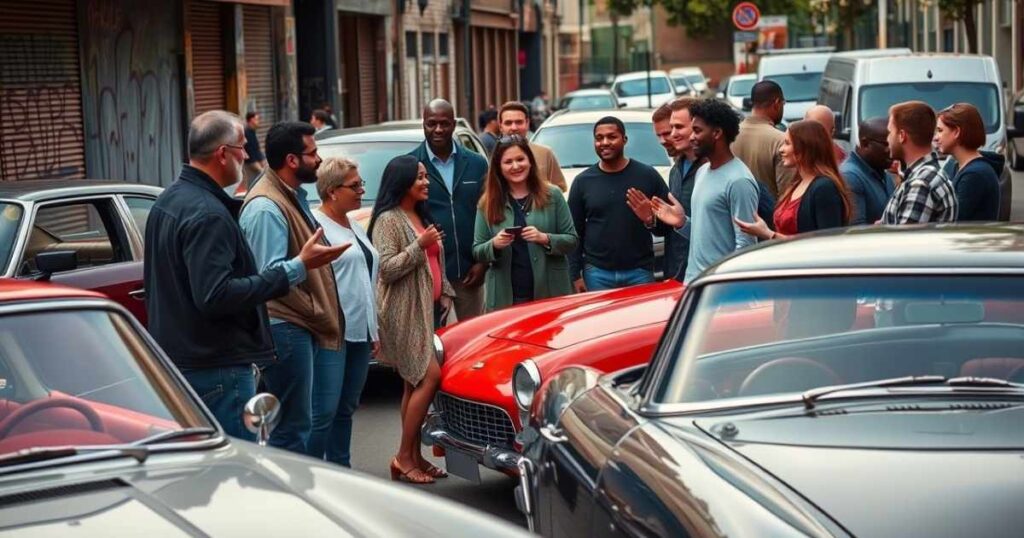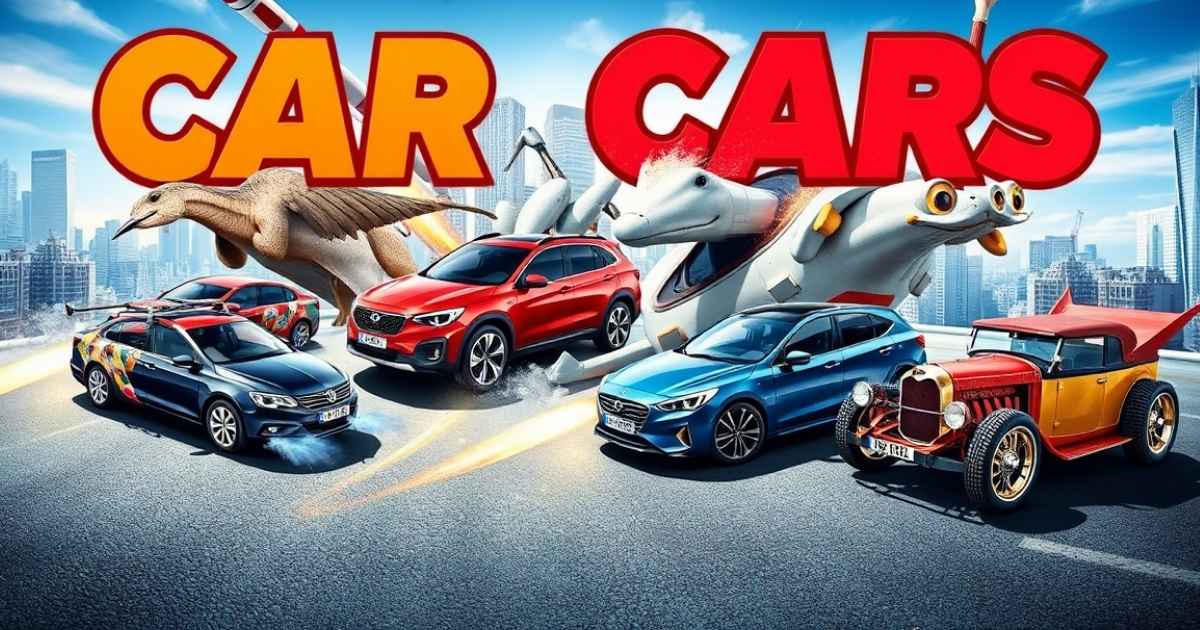Metaphors for cars are a creative way to describe life, emotions, and experiences. These metaphors for cars help convey deeper meanings by comparing cars to aspects of our daily lives. Whether it’s about speeding through challenges or taking life one step at a time, car metaphors offer vivid imagery to express complex ideas. In literature and conversations, a metaphor for cars often symbolizes freedom, choice, and the journey we take through life.
From car analogies that compare life’s twists to winding roads to freedom metaphors likening a car to a gateway to independence, these figures of speech bring power to language. Freedom similes like “life is a fast car” evoke a sense of excitement, while other metaphors for cars may represent our struggles or triumphs. By using these car metaphors, we tap into a universal experience of movement, control, and direction in both literal and figurative terms.
What are Metaphors for Cars?

Metaphors for cars are creative ways to compare cars to other things to express ideas, emotions, or experiences. Instead of describing something directly, we use cars as symbols to represent various aspects of life.
For example, life can be described as a journey, and car analogies might compare the road to life’s challenges or opportunities. Cars often represent freedom, with metaphors like
“life is a fast car” symbolizing excitement or independence. Similarly, freedom metaphors like “taking the wheel”
can suggest gaining control over one’s own path or decisions.
creative metaphors for cars can also symbolize power, speed, or obstacles. For instance, being “stuck in traffic” can represent feeling stuck in a situation, while “driving on the open road” might signify having a clear path ahead. These metaphors for cars help us connect familiar experiences to complex emotions or concepts, making language more vivid and meaningful.
38 Metaphors for Cars Meaning: In a Sentence
Let’s examine 38 metaphors for cars, their meanings, and how to use them in everyday conversation.
- “Life is a highway.”
Meaning: Life is a long, unpredictable journey.
In a sentence: Sometimes life feels like a highway, full of bumps and unexpected turns. - “The car is a rocket.”
Meaning: The car is speedy.
In a sentence: This sports car is a rocket on the highway. - “Full throttle.”
Meaning: Going full speed ahead, with maximum effort.
In a sentence: He went full throttle on his new project, determined to finish it fast. - “Cruising through life.”
Meaning: Moving smoothly or easily through situations.
In a sentence: After all the hard work, she’s now cruising through life. - “Stuck in traffic.”
Meaning: Being delayed or facing obstacles.
In a sentence: I was stuck in traffic for hours, making me late for the meeting. - “Taking the wheel.”
Meaning: Gaining control or leadership.
In a sentence: She’s taking the wheel of the project now that the manager is on leave. - “Burning rubber.”
Meaning: Moving quickly or leaving behind a trail.
In a sentence: The car sped off, burning rubber as it left the race. - “Shift gears.”
Meaning: Changing the direction or approach.
In a sentence: We need to shift gears and try a new strategy to solve this issue. - “On the road to success.”
Meaning: Making progress toward a goal.
In a sentence: With this new plan, we’re on the road to success. - “Out of gas.”
Meaning: Feeling drained or exhausted.
In a sentence: After working all night, I was completely out of gas. - “In the fast lane.”
Meaning: Living life at a rapid pace or taking risks.
In a sentence: He’s always been in the fast lane, both in business and in life. - “Need a pit stop.”
Meaning: Taking a break or recharging.
In a sentence: After hours of work, we all needed a pit stop to refresh ourselves. - “Accelerating through challenges.”
Meaning: Overcoming obstacles quickly.
In a sentence: She’s been accelerating through challenges, showing great determination. - “Running on empty.”
Meaning: Lacking energy or resources.
In a sentence: I’ve been running on empty all week, barely getting any rest. - “Racing against time.”
Meaning: Trying to finish something before a deadline.
In a sentence: I’m racing against time to finish this project by tomorrow. - “In the driver’s seat.”
Meaning: Being in control of a situation.
In a sentence: Now that she’s in the driver’s seat, things are running much smoother. - “Life’s a bumper car ride.”
Meaning: Life is full of unexpected collisions and surprises.
In a sentence: Some days, life feels like a bumper car ride, unpredictable and wild. - “Hit a speed bump.”
Meaning: Encountering a minor obstacle.
In a sentence: We hit a speed bump when the project’s funding was delayed. - “Out of control.”
Meaning: Things are happening beyond one’s ability to manage.
In a sentence: The situation at the party got out of control quickly. - “Burning the midnight oil.”
Meaning: Working late into the night.
In a sentence: I had to burn the midnight oil to finish the report on time. - “Taking a detour.”
Meaning: Changing plans or taking an unexpected path.
In a sentence: We had to take a detour when the main road was closed for construction. - “In the slow lane.”
Meaning: Moving at a slower pace, or taking it easy.
In a sentence: After a busy week, I’m happy to be in the slow lane this weekend. - “Speeding through life.”
Meaning: Living quickly, not taking time to enjoy the moments.
In a sentence: He’s been speeding through life without ever stopping to appreciate the small things. - “Reaching a dead end.”
Meaning: Coming to a point where no progress can be made.
In a sentence: After months of research, I’ve reached a dead end in this project. - “Coasting along.”
Meaning: Going through life without much effort or change.
In a sentence: He’s just coasting along, not putting in much effort at work lately. - “Taking the scenic route.”
Meaning: Choosing a more thoughtful or leisurely path.
In a sentence: Instead of rushing, we decided to take the scenic route home. - “Stalling out.”
Meaning: Coming to a stop or losing momentum.
In a sentence: My enthusiasm for the project stalled out halfway through. - “Running on fumes.”
Meaning: Continuing with little energy or resources left.
In a sentence: After the long meeting, I was running on fumes and barely staying awake. - “A smooth ride.”
Meaning: An easy or trouble-free experience.
In a sentence: The transition to the new software was a smooth ride for everyone involved. - “Hitting the brakes.”
Meaning: Slowing down or stopping progress.
In a sentence: The team decided to hit the brakes on the project until further information came in. - “Gear up for change.”
Meaning: Preparing for a shift or transformation.
In a sentence: It’s time to gear up for change and adapt to new challenges ahead. - “Pedal to the metal.”
Meaning: Giving maximum effort or speed.
In a sentence: We need to put the pedal to the metal if we want to meet this deadline. - “In overdrive.”
Meaning: Operating at maximum capacity or intensity.
In a sentence: During the final week of the campaign, the team was in overdrive. - “Changing lanes.”
Meaning: Shifting focus or perspective.
In a sentence: It’s time for the company to start changing lanes and exploring new opportunities. - “At a crossroads.”
Meaning: Facing a critical decision or turning point.
In a sentence: After receiving the job offer, she’s at a crossroads in her career. - “Driving force.”
Meaning: The main motivator or influence behind something.
In a sentence: Innovation is the driving force behind this company’s success. - “Behind the wheel.”
Meaning: Taking control or being in charge.
In a sentence: She’s now behind the wheel of the project, guiding it to completion. - “Put the brakes on.”
Meaning: To stop or slow down an action.
In a sentence: The CEO decided to put the brakes on the new initiative until more research was done.
Related Guide:
Words Ending With U: An Intriguing Journey into Language
The Impact of Cars on Our Language and Culture

metaphors for Cars have long been a symbol of freedom, independence, and progress, deeply woven into the fabric of modern life. From the early days of the automobile to the advanced vehicles of today, cars have played a significant role not only in how we travel but also in shaping the way we communicate and think.
The impact of cars on our language and culture is evident in the numerous metaphors, idioms, and phrases we use daily, all reflecting our relationship with these machines.
Throughout history, metaphors have been a reflection of technological innovation, societal change, and personal aspirations. As vehicles became more integrated into our lives, they started appearing in every facet of language from the way we describe our ambitions, to the way we talk about personal journeys and challenges.
Expressions like “hitting the gas” or “in the driver’s seat” are part of a lexicon that blends the mechanical with the personal, showing how cars influence our metaphors and communication.
metaphors for Moreover, cars have become a central part of popular culture, appearing in movies, music, and advertising, which further reinforce their role in shaping language. Whether it’s the “fast lane” or “running on empty,” car-related phrases provide a shorthand for describing our experiences, emotions, and societal values.
Metaphors and Emotions
Metaphors metaphors are a powerful tool for expressing emotions, turning abstract feelings into tangible experiences. By comparing emotions to familiar objects or actions, metaphors help us communicate complex feelings more clearly. For example, describing sadness as “a weight on my chest” evokes a physical sensation, making it easier for others to understand the emotional burden we carry.
Through metaphors, we connect our personal emotions to shared human experiences. Phrases like “a storm of anger” or “a heart of stone” resonate with many, creating a common language for discussing feelings. This helps foster empathy and understanding, allowing us to express ourselves in ways that feel more relatable.
How Cars Have Impacted Society

Cars have dramatically transformed society, reshaping how we live, work, and interact with the world around us. The invention of the automobile brought about a new era of mobility, providing individuals with the freedom to travel long distances quickly and independently.
This revolutionized not only personal transportation but also the structure of cities, as roads, highways, and parking lots became essential to modern life. With the ability to travel farther and faster, people were no longer confined to their immediate surroundings, opening up new possibilities for work, leisure, and exploration.
metaphors for The widespread use of cars also had a profound impact on the economy. The automotive industry became a driving force in creating jobs, boosting production, and encouraging innovation.
From car manufacturing to fuel production and repair services, the demand for cars fueled economic growth and created a vast network of related industries. This shift led to the rise of suburban living, as people were able to commute to work, live in more spacious areas, and enjoy a higher standard of living.
Culturally, cars have become symbols of freedom, status, and personal identity. They feature prominently in movies, music, and advertising, often representing independence and adventure.
Quiz: Test Your Knowledge of Car Metaphors
Now that you’ve learned some common metaphors for cars and sunsets, it’s time for a little quiz. Let’s see how well you can recognize and understand these metaphors.
10 Quiz Questions with Answers Based on Car and Sunset Metaphors
Question 1: If someone says, “My car is a rocket,” what are they describing?
(a) The car’s color.
(b) The car’s size.
(c) How fast the car is.
(d) The car’s fuel efficiency.
Answer: (c) How fast the car is.
Question 2: What does it mean if someone says, “The sunset was a fireball in the sky”?
(a) The sunset was cold and dreary.
(b) The sunset was bright and colorful.
(c) The sunset was calm and peaceful.
(d) The sunset was dark and gloomy.
Answer: (b) The sunset was bright and colorful.
Question 3: When someone says, “The engine purred like a kitten,” what does it mean?
(a) The engine is loud and noisy.
(b) The engine is running smoothly and quietly.
(c) The engine needs repair.
(d) The engine is overheating.
Answer: (b) The engine is running smoothly and quietly.
Question 4: If a person says, “I’m running on empty,” what are they likely referring to?
(a) They are full of energy.
(b) They are out of gas or energy.
(c) They are in a traffic jam.
(d) They are on a long road trip.
Answer: (b) They are out of gas or energy.
Question 5: What does the metaphor “I’m stuck in neutral” mean?
(a) They are moving quickly forward.
(b) They are feeling indecisive or inactive.
(c) They are in a rush.
(d) They are trapped in traffic.
Answer: (b) They are feeling indecisive or inactive.
Question 6: If someone says, “The road ahead is clear,” what do they mean?
(a) There are many obstacles ahead.
(b) There is nothing blocking their way, and the future looks open.
(c) The road is under construction.
(d) They are feeling lost.
Answer: (b) There is nothing blocking their way, and the future looks open.
Question 7: When someone says, “She’s in the driver’s seat,” what are they referring to?
(a) She is controlling the situation.
(b) She is on a road trip.
(c) She is taking a break.
(d) She is lost.
Answer: (a) She is controlling the situation.
Question 8: What does “Taking the wheel” mean metaphorically?
(a) Giving up control.
(b) Taking responsibility or control of a situation.
(c) Being lost.
(d) Following instructions.
Answer: (b) Taking responsibility or control of a situation.
Question 9: If someone says, “The sun is setting on my dreams,” what are they likely feeling?
(a) They are optimistic about the future.
(b) They are giving up on something they care about.
(c) They are ready for a new beginning.
(d) They are planning a trip.
Answer: (b) They are giving up on something they care about.
Question 10: When the metaphor “The sunset was a fiery orange” is used, what is being described?
(a) A peaceful end to the day.
(b) A chaotic, stormy evening.
(c) The beauty and vibrancy of the sunset.
(d) A gloomy and cloudy sky.
Answer: (c) The beauty and vibrancy of the sunset.
FAQ’s
How can a car be described as a powerhouse?
A car described as a powerhouse highlights its strength and performance. This is one of the many creative metaphors for cars that showcase its might.
What does it mean when a car is called a road warrior?
Referring to a car as a road warrior emphasizes its resilience and ability to handle long journeys. It’s a great example of creative metaphors for cars.
How does calling a car a chariot reflect its elegance?
A chariot metaphor brings out the car’s elegance and speed. It’s another way creative metaphors for cars capture their majestic and sleek qualities.
What does it mean when a car is called a beast?
Describing a car as a beast refers to its raw power and dominance. This is one of the creative metaphors for cars that focus on strength.
How can a car symbolize adventure in metaphors?
Cars can symbolize freedom and exploration, often referred to as vessels for adventure. These are perfect examples of creative metaphors for cars expressing excitement.
Conclusion
Metaphors for Cars offer a creative way to express complex ideas. Whether you’re using a car analogy to explain someone’s personality or a metaphor for cars to symbolize a journey, these expressions bring clarity and depth to communication. Car metaphors are not just about vehicles they represent movement, freedom, and direction in life. For example, life as a highway or a car’s engine as the driving force behind passion and ambition are common car metaphors that resonate deeply.
Furthermore, freedom metaphors and freedom similes often use cars to symbolize independence and choice. A car may represent the ability to go anywhere, which ties into the larger concept of personal freedom. From a car analogy to a simple metaphor for cars, these figures of speech enrich our language and help us better understand the world around us. Incorporating these metaphors for cars into conversation can bring a fresh perspective to ordinary discussions.

Atlas Reid is an experienced administrator with 5 years of expertise in managing operations, streamlining processes, and ensuring efficiency. Skilled in leadership, organization, and problem-solving to drive business success.








